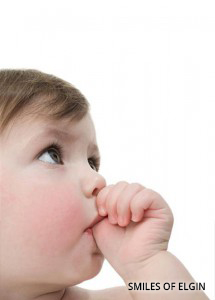1209 Dundee Avenue Elgin, IL 60120
Pacifiers and Thumb Sucking
Sucking is a natural, instinctual baby habit; infants derive a sense of comfort, relaxation, and security from using a thumb or pacifier as a sucking aid. According to research from the American Academy of Pediatric Dentistry (AAPD), the vast majority of children will cease using a pacifier before the age of four years old.
Thumb sucking can be a hard habit to break and tends to persist longer without intervention. Children who continue to suck thumbs or pacifiers after the age of five are at high-risk for developing dental problems.
How can thumb sucking and pacifier use damage children’s teeth?
Here is an overview of some of the risks associated with prolonged thumb sucking and pacifier use:
Jaw misalignment – Pacifiers come in a wide range of shapes and sizes, most of which are completely unnatural for the mouth to hold. Over time, pacifiers and thumbs can guide the developing jaws out of correct alignment.
Tooth decay – Many parents attempt to soothe infants by dipping pacifiers in honey, or some other sugary substance.
Roof narrowing – Repeated exposure to thumb and pacifier sucking actually cause the roof of the mouth to narrow (as if molding around the sucking device). This can cause later problems with developing teeth.
Slanting teeth – Growing teeth can be caused to slant or protrude by thumb and pacifier sucking, leading to poor esthetic results.
Mouth sores – Passive sucking is much less harmful than aggressive sucking. Aggressive sucking may cause sores or ulcers to develop.
If you do intend to purchase a pacifier:
- Buy a one-piece pacifier to reduce the risk of choking.
- Buy an “orthodontically correct” model.
- Do not dip it in honey or any other sugary liquid.
- Rinse with water to prevent bacterial transmissions.

How can I encourage my child to stop thumb or pacifier sucking?
In most cases, children naturally relinquish the pacifier or thumb over time. However, when thumb sucking or pacifier use persists past the age of five, a gentle intervention may be required.
Here are some helpful suggestions:
- Ask the pediatric dentist to speak with the child about stopping.
- Buy an ADA recommended specialized dental appliance to make it difficult for the child to engage in sucking behaviors.
- Implement a reward system whereby the child can earn tokens or points towards a desirable reward for not thumb sucking or using a pacifier.
- Wrap thumbs in soft cloths or mittens at nighttime.
Remember: the breaking of a habit takes time, patience, and plenty of encouragement!
Office Hours
| Monday | 10:00 to 6:00 |
| Tuesday | 10:00 to 6:00 |
| Wednesday | 11:00 to 8:00 |
| Thursday | 10:00 to 6:00 |
| Friday | 10:00 to 6:00 |
| Saturday | 8:00 to 3:00 |
| Sunday | Appointment only |



Recent Comments